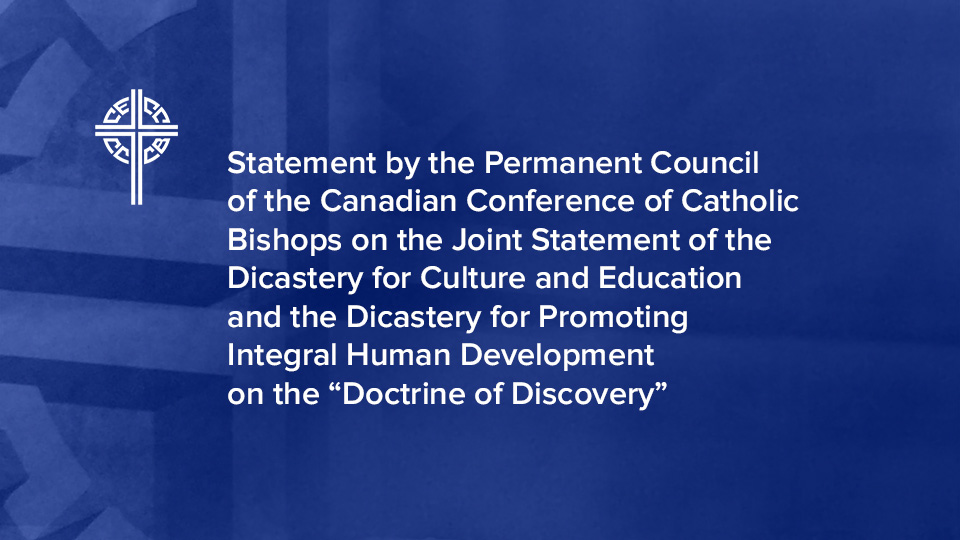Statement by the CCCB on the “Doctrine of Discovery”
Canadian Conference of Catholic Bishops
Thursday, March 30, 2023

In no uncertain terms, the Church’s magisterium upholds the respect due to every human being. The Catholic Church therefore repudiates those concepts that fail to recognize the inherent human rights of Indigenous peoples, including what has become known as the legal and political ‘doctrine of discovery.'The Joint Statement further emphasizes that the ‘Doctrine of Discovery’ is not part of the teaching of the Catholic Church and that the papal documents under scrutiny by some scholars – particularly the Bulls Dum Diversas (1452), Romanus Pontifex (1455) and Inter Caetera (1493) – have never been considered expressions of the Catholic faith. At the same time, it acknowledges that these papal bulls did not adequately reflect the equal dignity and rights of Indigenous Peoples; that they were manipulated for political purposes by competing colonial powers; and that Indigenous Peoples suffered the terrible effects of the assimilation policies of colonizing nations. Furthermore, the Joint Statement expresses support for the principles in the United Nations Declaration on the Rights of Indigenous Peoples, the implementation of which would help to improve the living conditions of Indigenous Peoples, to protect their rights, as well as to support their self-development in continuity with their identity, language, history, and culture. The CCCB, the United States Conference of Catholic Bishops (USCCB), and the Pontifical Committee for Historical Sciences are together exploring the possibility of organizing an academic symposium with Indigenous and non-Indigenous scholars to further deepen historical understanding about the ‘Doctrine of Discovery.’ This idea of a symposium has likewise received encouragement from the two Dicasteries that issued today’s Joint Statement. In closing, the CCCB echoes Pope Francis’ statement from Quebec City in July 2022, cited in today’s Declaration, that “never again can the Christian community allow itself to be infected by the idea that one culture is superior to others, or that it is legitimate to employ ways of coercing others.” The Canadian Conference of Catholic Bishops is the national assembly of the Catholic Bishops in Canada who currently hold office. The Permanent Council is the highest decisional body of the Conference when the Plenary Assembly is not in session.
Related Articles:
Category: Canada, General Posts, Vatican
Tag: A Journey Toward Healing and Reconciliation, doctrine of discovery, Indigenous peoples, Truth and Reconciliation
Is Artificial Intelligence good or bad? A new Vatican document on using AI responsibly
Monday, March 24, 2025
 Julian Paparella
Julian Paparella
What are the Church’s views on artificial intelligence? How are we supposed to think of the rapidly expanding field of AI as Christians in the world today?
Veneration of the Crown of Thorns during Lent
Friday, March 14, 2025
 Aline Haddad
Aline Haddad
The Holy Crown of Thorns was returned to Notre-Dame de Paris after the rededication in December, restoring a beloved Lenten devotion.
Dominican Friars Youth Interfaith Video Contest 2025
Thursday, March 13, 2025
 Salt + Light Media
Salt + Light Media
The Office for Interreligious Dialogue and the Dominican Friars of Toronto invite students in grades 9-12 to participate in the 2025 Youth Interfaith Video Contest.
Pray with Pope Francis Reflection – March 2025
Monday, March 10, 2025
 Fr. Edmund Lo, SJ
Fr. Edmund Lo, SJ
In this month of March, Pope Francis invites us to pray for families who find themselves in crisis: That broken families might discover the cure for their wounds through forgiveness, rediscovering each other’s gifts, even in their differences.
Looking at our babies, glimpsing how God sees us
Saturday, March 8, 2025
 Julian Paparella
Julian Paparella
How can the experience of parenting give us a sense of God's compassionate, patient, and merciful presence with us?













